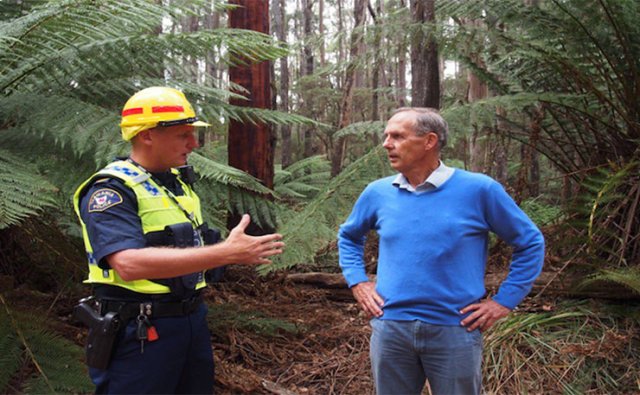
Former Greens leader Bob Brown has been arrested while protesting against logging in Tasmania's Lapoinya Forest. He is the third person to be charged under the Tasmanian government's pro-forestry legislation, the Workplaces (Protection from Protesters) Act 2014.
Brown was arrested in an area of state forest marked for logging at Lapoinya in north-western Tasmania on January 25. The area is designated forestry land and has been selectively logged in the past. Last year Forestry Tasmania announced a plan to clearfell 49 hectares of the forest.
Work was to begin in January, but the tiny town of Lapoinya, with a population of only a few hundred, has been fighting the plans. They say the forest is home to the endangered Tasmanian giant freshwater lobster and a disease-free population of Tasmanian devils.
The protest in Lapoinya began on January 18 as Forestry Tasmania prepared to start logging the area's regrowth forest.
John Henshaw and Jessica Hoyt were arrested when they were among nine people who walked into the logging area to try to stop workers from bulldozing the forest. Henshaw and Hoyt face fines of $10,000.
Like Henshaw and Hoyt, Brown was charged with failing to comply with a direction to leave a business access area, and has been banned from going back to the Lapoinya logging area under the terms of his bail conditions.
Brown said after his release: “I didn't go with the intention of being arrested, but when I saw the destruction, I had to take a stand.”
The area, including a bridle trail, had been popular among nature lovers before the loggers moved in.
Brown said: “It's now a bulldozed highway, a logging road with tree ferns, trees and shrubbery flattened and bare earth. And they're getting ready to log the forest next door.”
Brown claims the logging is a loss-making exercise.
He said in a statement: “One independent economic analysis estimates the cost to taxpayers of this unnecessary invasion of the Lapoinya forest at $50,000 but, with Forestry Tasmania's bid for [Forest Stewardship Council] certification undermined, the flow-on costs will be much more.”
Brown called the decision to log Lapoinya “a criminal act” saying “ it is the ministers, not the residents of Lapoiyna, who should be facing fines and jail sentences”.
In an opinion piece for New Matilda Brown said: “Two weeks ago, I walked the bridal track along a perimeter of the Lapoinya Forest with some of the local people. I heard about their desperation to save the forest and its bevy of rare and endangered wildlife, including Tasmanian devils and spotted tiger quolls (both are large carnivorous marsupials), and astacopsis gouldi.
“The latter is the world's largest freshwater crayfish: it grows up to 80 centimetres in length and 6 kilograms in weight and the pristine creeks in the Lapoinya forest are a vital nursery. Logging extrudes mud into the streams and covers the naturally-fallen timber which the crayfish eat: so they starve.
“Modern industrial logging — unlike the selective logging of old which allowed the native forest to recover — involves clearfelling and then firebombing, with the deliberate knowledge of all concerned, including [Greg Hunt, that the native species are eliminated and replaced with a monoculture plantation set for endless and rapid future clearfelling and replacement.”
About 150 people rallied on January 21 on Hobart's Parliament lawns in solidarity with forest protesters at Lapoinya. The rally was organised by the Bob Brown Foundation in response to the state government and Forestry Tasmania's insistence on pushing ahead with the logging plans.
Indiana Massey, who grew up at Lapoinya, told the rally locals were deeply connected to the forest. She spoke about spending her childhood camping in the area, where she saw giant crayfish, Tasmanian devils and quolls.
“The forest has helped shape the people who live there and who grew up there,” she said.
Like the article? Subscribe to Green Left now! You can also like us on Facebook and follow us on Twitter.